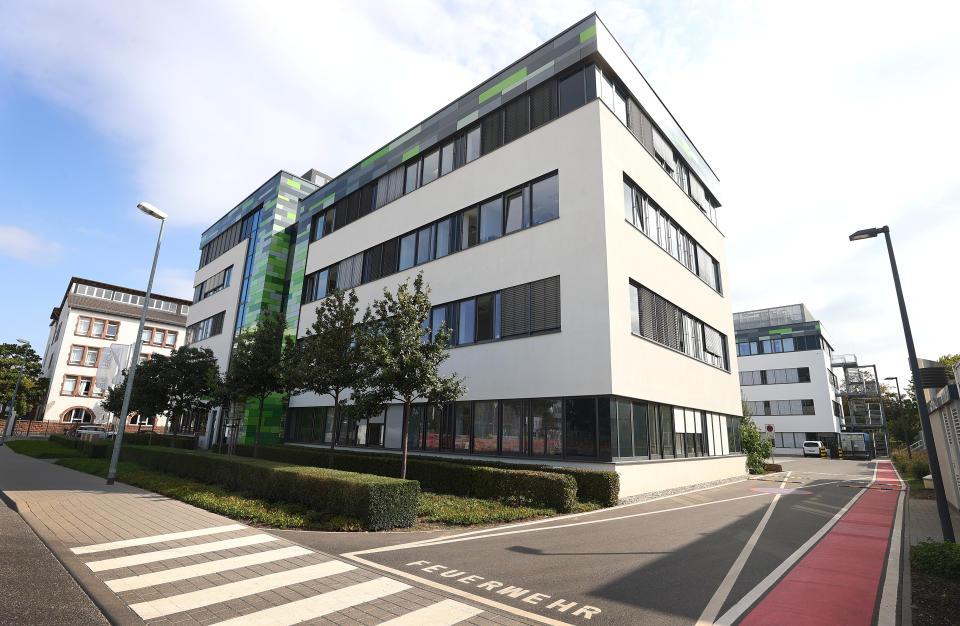BioNTech founder on COVID-19 vaccine trial results: 'An important step for the world'

BioNTech (BNTX), the German company currently leading the race with partner Pfizer (PFE) to develop a COVID-19 vaccine reported its third quarter results on Tuesday, posting a net loss of €210m ($247.6m, £187.2m) for the three months ending September. Losses for the nine months to end of September totalled €351.7m.
The company posted revenues of €67.5m in the third quarter, the bulk of which was from collaboration and licence agreements, and revenue in the nine months ending September of €136.9m.
BioNTech received grant funding of €375m from the German government in September.
It said today that it expects net cash used in operating activities and for purchases of property, plant and equipment to be within the previously forecast range of €450m and €600m for the full year 2020 – likely the upper end of that range due to acquisition of its manufacturing facility.
BioNTech bought a new manufacturing site in September to ramp up production once its vaccine gets approval. It now has three sites in Germany.
BioNTech in partnership with US pharma giant Pfizer announced on Monday that its messenger-RNA vaccine candidate, called BNT162, showed an over-90% effectiveness rate in interim phase 3 trials involving more than 43,000 participants.
“I am incredibly happy about the accomplishment that we can report to you today,” co-founder and chief executive Ugur Sahin said on an investor call on Tuesday. “We believe the news from yesterday represents a watershed milestone for our company and one that we believe will constitute an important step for the world after more than eight months into the worst pandemic in more than a century.”
READ MORE: COVID-19 vaccine: BioNTech and Pfizer report 90% effectiveness in trials
“When we made this decision to initiate a COVID-19 vaccine programme in January, we did that against a backdrop of considerable uncertainty — for example it was not known at that point in time if a vaccine would work at all,” Sahin said. “But when that decision was made we went all in… without knowing how the pandemic would play out.”
He said that they did so because they felt a “a duty to try and do something, because we believed our technology had the potential to make a difference — with the news this week I believe now more than ever that we are in a position to make that difference.”
WATCH: What does the Pfizer vaccine announcement mean for me?
Sahin said that Pfizer had submitted for regulatory approval with the European, UK, and Canadian drug approval authorities. He said he believes they are on track to submit an early-use authorisation to the FDA as early as the third week of November. They have also started clinical trials in Japan and China.
READ MORE: The German company behind the potential first COVID-19 vaccine
BioNTech said on the investor call that the vaccine would be shipped in a special thermal shipping boxes that would maintain it at ultra-low temperature for up to 10 days if stored at 15C to 25C without opening and up to 15 days if opened and then re-iced.
That means it can be stored for up to six months in a commercially available ultralow temperature freezer, and up to five days after transfer in a normal freezer, at 2C to 8C.
“That gives us some flexibility with respect to storage and distribution,” the company said. “In general, we are engaging specialised supply chain providers for air and ground shipping to-and-from our manufacturing sites in Europe and the US.”
READ MORE: German government takes €300m stake in vaccine developer CureVac
The order books at BioNTech-Pfizer are filling up fast as governments rush to lock in supplies of vaccines that could potentially be successful. The company said that it had committed to 570 million doses (subject to clinical success and regulatory approval) in 13 countries with an option to provide an additional 600 million doses in the EU and US for 2020 and 2021.
The European Commission is expected to reach an initial agreement for 200 million doses this week. In August, the companies agreed to supply the US government with 100 million doses, and the New Zealand government ordered 1.5 million doses last month.
Other companies working on vaccines include AstraZeneca (AZN.L) with the University of Oxford, US-based Moderna (MRNA), Novavax (NVAX), Johnson&Johnson (JNJ), and Germany’s CureVac (CVAC).

 Yahoo Finance
Yahoo Finance 